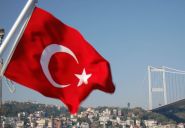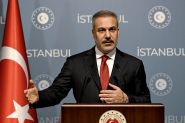- Home
- Middle East
- Iran, European Powers to Hold Nuclear Talks in Turkey as Trump Says Deal Is ‘Getting Close’

ran and European powers prepare for key talks in Istanbul amid ongoing nuclear deal negotiations and rising tensions over potential sanctions. ©AFP
Iran is set to meet with Britain, France, and Germany in Turkey on Friday, following U.S. President Donald Trump’s statement that a nuclear deal with Tehran is “getting close.”
The upcoming Istanbul talks come after Iranian Foreign Minister Abbas Araghchi warned of “irreversible” consequences if European powers move to reimpose United Nations sanctions on Iran – sanctions that were lifted under the 2015 nuclear agreement.
The so-called E3 – Britain, France, and Germany – were original parties to the 2015 deal alongside China, Russia, and the United States. However, in 2018, Trump unilaterally withdrew from the agreement and reinstated sanctions targeting Iran’s banking sector and oil exports, effectively crippling the deal.
In response, Iran began rolling back its commitments under the accord, which had provided sanction relief in exchange for UN-monitored restrictions on its nuclear activities.
The three European nations are now considering activating the deal’s “snapback” mechanism, which would reinstate UN sanctions in reaction to Iran’s non-compliance. This option is set to expire in October.
Iran’s top diplomat warned that such a move “risks provoking a global nuclear proliferation crisis that would primarily affect Europeans themselves.” Yet, in an interview with the French weekly Le Point, Araghchi also noted Tehran’s readiness to “turn the page” in relations with Europe.
The Friday meeting will be held at the deputy foreign ministers level and follows a fourth round of Iran-U.S. nuclear talks earlier this week, which Tehran described as “difficult but useful.” A U.S. official said Washington was “encouraged” by the progress.
“Getting Close” to a Deal
Ahead of the talks, China – another key player in recent nuclear discussions with Iran – reaffirmed its commitment to a political and diplomatic resolution. A Chinese Foreign Ministry spokesman, Lin Jian, emphasized China’s respect for Iran’s peaceful nuclear activities and opposition to all illegal unilateral sanctions.
During a visit to Qatar on Thursday, President Trump expressed optimism, saying the U.S. was “getting close” to a deal that could prevent military conflict. “We’re not going to be making any nuclear dust in Iran,” he said.
The Oman-mediated talks mark the highest-level engagement between Washington and Tehran since the U.S. withdrew from the 2015 accord.
While Trump has continued his “maximum pressure” policy, combining diplomacy with threats of military action, reports emerged that the U.S. had offered Iran a “written proposal” during the recent talks. Iran’s Araghchi denied receiving any such proposal but reiterated Tehran’s readiness to build trust and transparency regarding its nuclear program in exchange for sanction relief.
Trump has described his offer as an “olive branch,” warning it would not last indefinitely. He also threatened “massive maximum pressure,” including reducing Iranian oil exports to zero if negotiations fail.
Iran’s Nuclear Program
Iran currently enriches uranium to 60 percent purity – well above the 3.67 percent limit set by the 2015 deal but below the roughly 90 percent needed for a nuclear weapon.
Tehran maintains that its right to enrich uranium for peaceful purposes is “non-negotiable,” though it has expressed openness to temporary limits on enrichment levels.
On Wednesday, Mohammad Eslami, head of Iran’s Atomic Energy Organization, reaffirmed that Iran does not seek nuclear militarization and that its enrichment activities remain under UN monitoring. “The dismantling of enrichment is not accepted by Iran,” he stressed.
With AFP
Read more



Comments